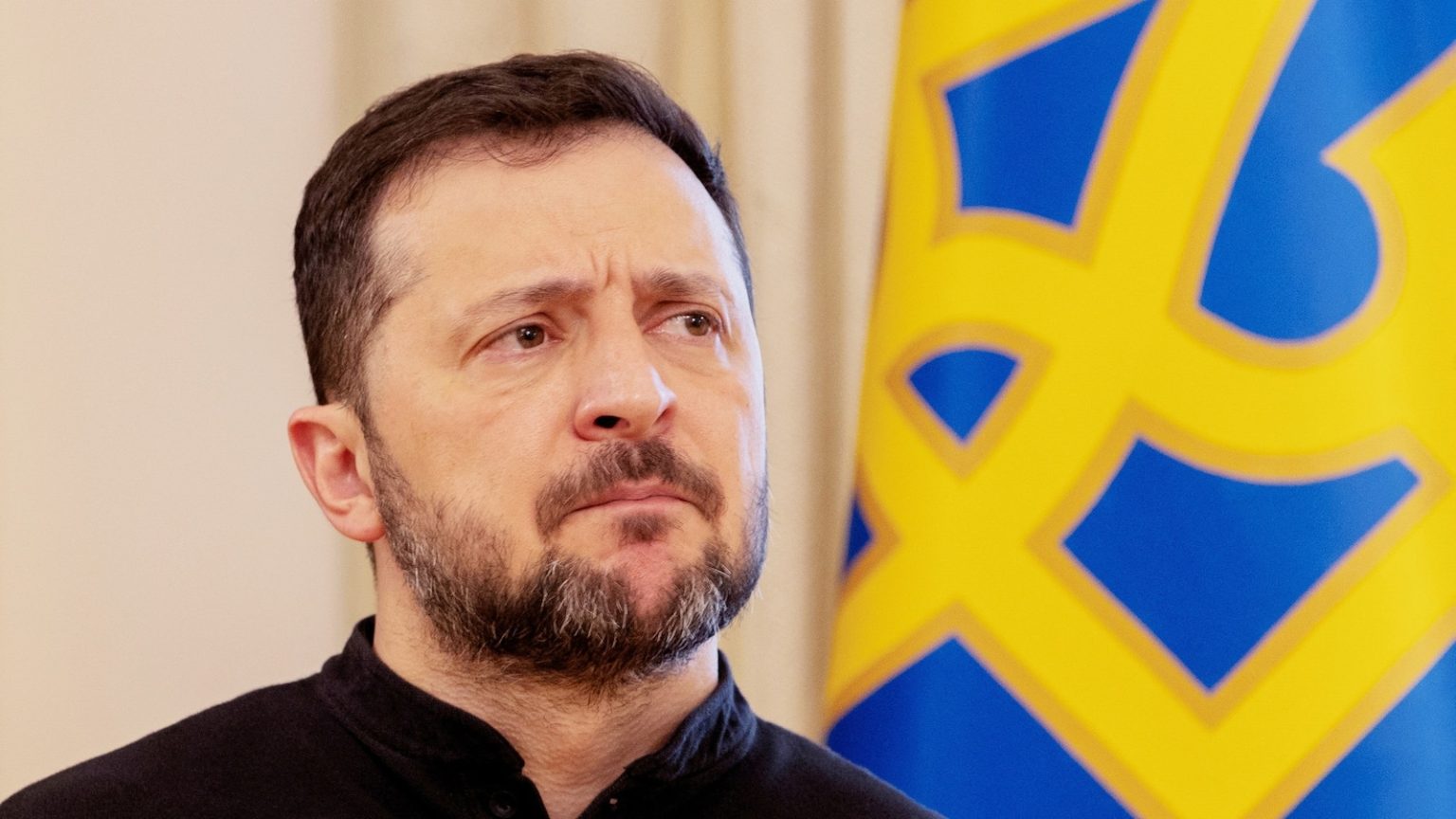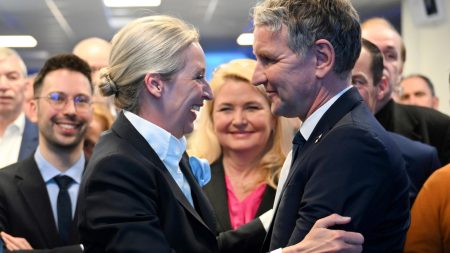Questioning Zelenskyy’s Legitimacy: Trump and Putin’s Shared Narrative
In a striking alignment of rhetoric, President Donald Trump joined Russian President Vladimir Putin in casting doubt on the legitimacy of Ukrainian President Volodymyr Zelenskyy. During a press conference at Mar-a-Lago, Trump alleged that Zelenskyy’s approval rating among Ukrainians had plummeted to a mere 4%. However, this claim, made without any evidence, starkly contradicts the findings of reputable Ukrainian polls. The most recent survey conducted by the Kyiv International Institute of Sociology (KIIS) in early February revealed that 57% of Ukrainians trust Zelenskyy, a figure significantly higher than the 4% Trump suggested. This discrepancy highlights a clear disconnect between Trump’s assertions and the reality on the ground in Ukraine.
While Zelenskyy’s approval ratings have indeed declined from the extraordinary highs seen early in the war—reaching 77% in December 2023 and a remarkable 90% in May 2022, just months after Russia’s invasion—they remain robust. The February KIIS poll even noted a 5% increase in trust compared to December 2024. These numbers underscore Zelenskyy’s enduring popularity amidst the ongoing conflict. Despite the challenges of wartime leadership, Zelenskyy’s consistent approval ratings exceed those of many democratic leaders worldwide, demonstrating his strong connection with the Ukrainian people.
Zelenskyy’s True Popularity: A Reality Check
Contrary to Trump’s claims, President Zelenskyy maintains a significant level of support among Ukrainians. The KIIS poll, widely respected for its credibility, showed that 57% of respondents expressed trust in Zelenskyy. This figure, while lower than the peaks observed earlier in the war, remains impressive given the immense pressures of leading a nation under siege. Ukrainian officials were quick to highlight that Zelenskyy’s approval ratings surpass those of many global leaders, including Trump himself. Recent U.S. polls, such as those conducted by FiveThirtyEight, YouGov/The Economist, and Gallup, indicate Trump’s approval ratings hover around 46%–48%, significantly lower than Zelenskyy’s current standing.
This stark contrast raises questions about the motivations behind Trump’s and Putin’s attempts to undermine Zelenskyy’s legitimacy. While Zelenskyy has faced criticism for certain decisions, his leadership during the war has earned him widespread admiration both domestically and internationally. Ukraine’s former commander-in-chief, Gen. Valerii Zaluzhnyi, is often cited as a potential challenger, but he currently serves as Kyiv’s ambassador to the U.K. and has not yet entered politics. For now, Zelenskyy remains the most popular and influential political figure in Ukraine.
Comparing Support Across Leaders: Zelenskyy’s Standing
The disparity between Zelenskyy’s actual approval ratings and Trump’s claims is not just a matter of numbers; it reflects a broader political strategy. By downplaying Zelenskyy’s popularity, Trump and Putin aim to weaken his position on the international stage, potentially paving the way for a leadership change in Ukraine. However, the reality is that Zelenskyy’s approval ratings are not only robust but also higher than those of many Western leaders. For instance, Zelenskyy’s 57% trust rating surpasses Trump’s recent approval numbers, as well as those of other leaders such as British Prime Minister Keir Starmer and Turkish President Recep Tayyip Erdogan.
This comparison underscores the resilience of Zelenskyy’s leadership and the strong bond he has cultivated with the Ukrainian people. Despite the immense challenges of the war, Zelenskyy has managed to maintain a level of trust and support that many leaders in more stable environments struggle to achieve. His ability to rally the nation and inspire international solidarity has been a defining feature of his presidency.
Challenges to Zelenskyy’s Leadership: Potential Rivals
While Zelenskyy remains the most popular political figure in Ukraine, there are potential challengers who could reshape the country’s political landscape. General Valerii Zaluzhnyi, Ukraine’s former commander-in-chief, is often cited as a possible rival. However, Zaluzhnyi currently serves as Kyiv’s ambassador to the U.K. and has not yet signaled any intention to enter politics. His military background and reputation as a strong leader could make him a formidable opponent in any future election, but for now, Zelenskyy’s position appears secure.
The possible emergence of Zaluzhnyi as a political figure highlights the evolving nature of Ukrainian politics. As the war with Russia continues, the dynamics of leadership and public opinion are likely to shift in response to new challenges and developments. For now, Zelenskyy’s strong approval ratings and lack of credible challengers ensure his continued dominance of Ukraine’s political scene.
Motivations Behind the Criticism: A Geopolitical Agenda
The shared narrative of Trump and Putin questioning Zelenskyy’s legitimacy appears to be driven by a broader geopolitical agenda. For Putin, removing Zelenskyy is a key strategic objective, both as a symbolic victory for Russia and as an opportunity to install a pro-Russian leader in Kyiv. Putin’s push for early elections in Ukraine, even before a final peace deal, reflects this goal. By advocating for new elections, Putin aims to exploit any perceived weaknesses in Zelenskyy’s position and potentially destabilize Ukraine’s government.
Trump’s recent comments suggest he may be aligning with this perspective. By echoing Putin’s doubts about Zelenskyy’s legitimacy, Trump seems to be implicitly supporting the idea of a leadership change in Ukraine. This stance raises questions about Trump’s motivations and whether he, like Putin, views Zelenskyy’s removal as a means to achieve his own geopolitical objectives. The alignment of interests between Trump and Putin on this issue is particularly striking, given their shared skepticism of Zelenskyy and their apparent desire to shape Ukraine’s political future.
Zelenskyy’s Resolute Response: Fact-Checking Trump and Putin
President Zelenskyy wasted no time in responding to Trump’s claims, rebuking the American leader for peddling what he described as Russian disinformation. In a firm but measured tone, Zelenskyy dismissed Trump’s suggestion that his approval rating had dropped to 4%, noting that such claims were false and originated from Russian sources. "If someone wants to replace me right now, then right now it won’t work," Zelenskyy told reporters in Kyiv, emphasizing his strong popular support. He also announced plans to conduct opinion polls comparing the trust ratings of world leaders, including Trump, British Prime Minister Keir Starmer, and Turkish President Recep Tayyip Erdogan.
Zelenskyy’s response was both defiant and diplomatic, reflecting his determination to defend Ukraine’s sovereignty and his leadership. While acknowledging Trump’s importance as a global leader and expressing gratitude for U.S. support, Zelenskyy criticized Trump for being influenced by Russian disinformation. "As for President Trump," Zelenskyy said, "with all due respect to him as a leader of the American people, who we deeply respect and are thankful for all his support, but President Trump, unfortunately, is living in this disinformation space." Zelenskyy’s comments highlight the ongoing battle for narrative control in the conflict, as well as his commitment to maintaining Ukraine’s independence and democratic integrity.















